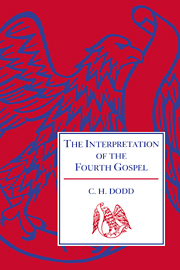Book contents
- Frontmatter
- Contents
- PART I THE BACKGROUND
- 1 The setting in early Christianity
- 2 The higher religion of Hellenism: the Hermetic literature
- 3 Hellenistic Judaism: Philo of Alexandria
- 4 Rabbinic Judaism
- 5 Gnosticism
- 6 Mandaism
- PART II LEADING IDEAS
- PART III ARGUMENT AND STRUCTURE
- APPENDIX: Some considerations upon the historical aspect of the Fourth Gospel
- Index Locorum
- Index Nominum
5 - Gnosticism
from PART I - THE BACKGROUND
Published online by Cambridge University Press: 10 December 2009
- Frontmatter
- Contents
- PART I THE BACKGROUND
- 1 The setting in early Christianity
- 2 The higher religion of Hellenism: the Hermetic literature
- 3 Hellenistic Judaism: Philo of Alexandria
- 4 Rabbinic Judaism
- 5 Gnosticism
- 6 Mandaism
- PART II LEADING IDEAS
- PART III ARGUMENT AND STRUCTURE
- APPENDIX: Some considerations upon the historical aspect of the Fourth Gospel
- Index Locorum
- Index Nominum
Summary
The terms ‘Gnostic’ and ‘Gnosticism’ are used by modern writers in a confusing variety of senses. If they refer, as by etymology they should refer, to the belief that salvation is by knowledge, then there is a sense in which orthodox Christian theologians like Clement of Alexandria and Origen, on the one hand, and Hellenistic Jews like Philo, and pagan writers like the Hermetists, on the other, should be called Gnostics; and in this wide sense the terms are used by many recent writers, especially in Germany. In this sense the Gospel according to John should be classed as Gnostic. Ancient writers use the term ‘Gnostic’ sometimes as the proper name of certain sects or schools of thought, while others appear to use it loosely with a note of sarcasm. I use it here in the way in which it has been generally used for many years by theologians in this country, as a label for a large and somewhat amorphous group of religious systems described by Irenaeus and Hippolytus in their works against Heresy (Adversus Haereses and Refutatio Omnium Haeresium), and similar systems known from other sources. This is a use of the term which has no warrant in these writers themselves, or in any ancient authorities, but it is convenient, and need not be misleading.
Widely as these systems differ in detail, most of them have a certain family likeness, and the same clichés tend to recur in a way which encourages the attempt to find some common basis.
- Type
- Chapter
- Information
- The Interpretation of the Fourth Gospel , pp. 97 - 114Publisher: Cambridge University PressPrint publication year: 1953
- 1
- Cited by



